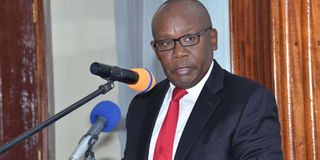AG Githu Muigai appoints task force to review death penalty

Attorney-General Githu Muigai who has appointed a 13-member task force to review the legislative framework on death penalty. PHOTO | FILE | NATION MEDIA GROUP
What you need to know:
- Supreme Court judges in December directed the Attorney-General to set up a framework to deal with re-hearing of cases relating to the mandatory nature of the death sentence.
- The judges found the mandatory nature of the death sentence unconstitutional.
- The task force will recommend parameters of what ought to constitute life imprisonment, formulate amendments and enact a law to give effect to the Supreme Court judgment.
Attorney-General Githu Muigai has appointed a 13-member task force to review the legislative framework on death penalty and other matters.
In a Gazette Notice published on Friday, Prof Githu Muigai gave the task force 12 months to complete the work.
DEATH PENALTY
Other than the legislative framework, the task force to be chaired by Ms Maryann Njau-Kimani will set up a framework to deal with rehearing of sentencing of persons on death row as directed by the Supreme Court in December last year.
In a landmark judgment, six judges of the Supreme Court found that the mandatory nature of the death sentence as provided for under Section 204 of the Penal Code is unconstitutional.
The court led by Chief Justice David Maraga, Deputy CJ Philomena Mwilu, Justices Jackton Ojwang’, Smokin Wanjala, Njoki Ndung’u and Isaac Lenaola, said a person facing the death sentence is most deserving to be heard in mitigation because of the finality of the sentence.
CASES
According to the judges, during mitigation, the offender's version of events may be heavy with pathos necessitating the court to consider an aspect that may have been unclear during the trial process.
They said that mitigation might “call for pity more than censure or on the converse, impose the death sentence, if mitigation reveals an untold degree of brutality and callousness”.
The judges, however, said that convicts on death row should not approach the Supreme Court for the hearing of their cases but await appropriate guidelines for disposal of the same.
The judges directed the Attorney-General to urgently set up a framework to deal with rehearing of cases relating to the mandatory nature of the death sentence.
DEATH ROW
A total of 6,058 prisoners have been sentenced to death since 2011.
The Kenya National Bureau of Statistics shows that the death sentences were highest in 2014, when 2,757 offenders were condemned to face the hangman.
“We are of the view that mitigation is an important congruent element of fair trial.
“The fact that mitigation is not expressly mentioned as a right in the Constitution does not deprive it of its necessity and essence in the fair trial process,” the judges said.
They noted that Article 28 of the Constitution provides that every person has inherent dignity and the right to have that dignity protected.
“It is for this Court to ensure that all persons enjoy the rights to dignity.
“Failing to allow a judge discretion to take into consideration the convicts’ mitigating circumstances, the diverse character of the convicts, and the circumstances of the crime, but instead subjecting them to the same (mandatory) sentence thereby treating them as an undifferentiated mass, violates their right to dignity,” they observed.
TASK FORCE
The task force will also recommend parameters of what ought to constitute life imprisonment, formulate amendments and enact a law to give effect to the judgment, and create awareness by sensitising the public on the judgment and its implications.
Others members of the task force are Supreme Court Registrar Esther Nyaiyaki, Mr Fredrick Ashimosi from the DPP’s office, Ms Emily Chweya, Mr Joseph Were and Mr Dickson Njeru, among others.
The team is required to prepare proposals upon undertaking comparison studies with other jurisdictions; and consult all stakeholders with divergent views on death penalty, including religious leaders, parliamentary committees and civil society organisations.




